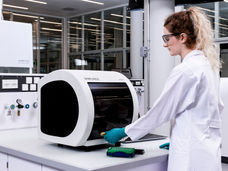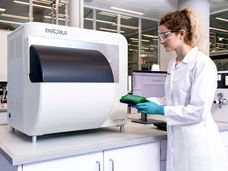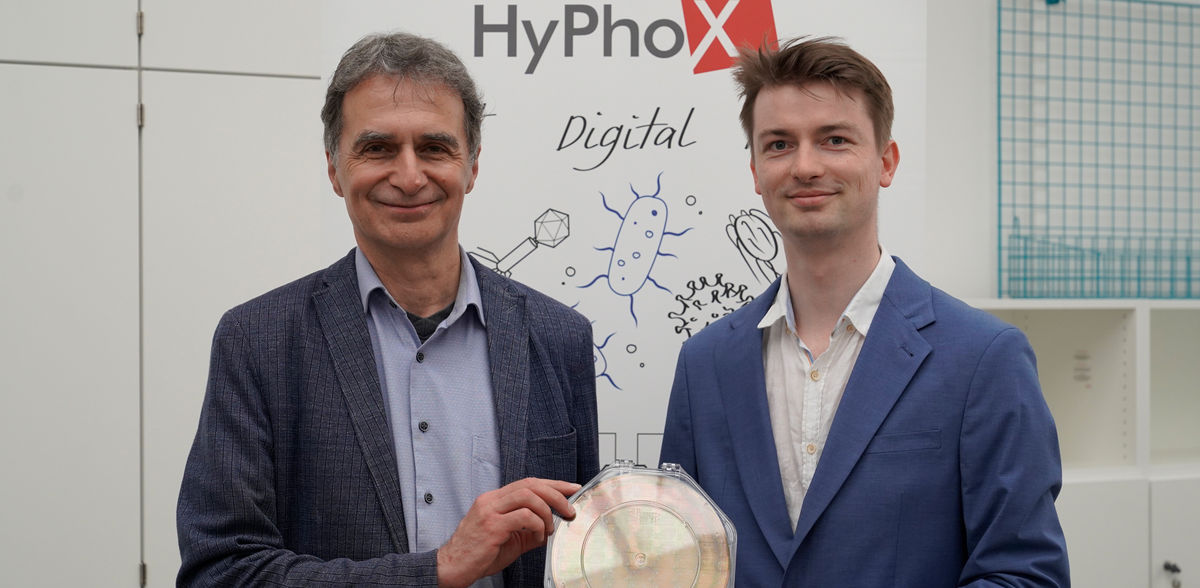Startup HyPhoX develops miniaturized biosensors with support from BAM
"The innovative thing about our sensor is that we combine optical, electrical and biochemical analytics on one chip, and we do it in a handy, portable device"
Toxic substances, viruses and other microorganisms are a danger to humans and the environment. A team of founders from the Leibniz Institute for Innovative Microelectronics (IHP) and the Technical University of Wildau, with the support of the Federal Institute for Materials Research and Testing (BAM), is developing an innovative and cost-effective analysis tool for the rapid detection of these substances. It delivers results within minutes and can be used in food analysis, medical technology and environmental monitoring.
Contaminations that endanger health occur time and again in the environment or in the food sector - from salmonella in mayonnaise and meat to legionella in drinking water. Rapid detection is needed to contain the spread of such contaminants and minimize their impact. However, laboratory tests are usually time-consuming and cost-intensive: several days usually elapse between taking a sample and transporting it to a specialist laboratory and obtaining the result. This means that in an emergency, valuable time is lost to warn the population.
The founding team of HyPhoX has set out to change this. The young scientists, who are conducting research at BAM, IHP and TH Wildau, have developed an innovative biochip. It integrates optical, electrical and microfluidic components on just one square millimeter. Thanks to the lab-on-a-chip technology, a small analysis laboratory can be accommodated in a tiny space. Even the smallest amounts of sample fluids can thus be analyzed directly on site and in real time.
"The innovative thing about our sensor is that we combine optical, electrical and biochemical analytics on one chip and do so in a handy, portable device," says Martin Paul, co-founder of HyPhoX, who did his doctorate at BAM.
Now the team wants to bring the innovative sensor to market. Over the next year and a half, it will receive support from BAM, IHP and TH Wildau. "Technology transfer through spin-offs is one of BAM's core tasks," emphasizes Dr. Michael G. Weller, head of BAM's Protein Analytics Department. "That's why we are pleased to be able to provide significant support to the young startup with BAM's expertise and infrastructure in immunoassay and biosensor development."
HyPhoX is financed by the EXIST funding program of the Federal Ministry of Economics and Climate Protection (BMWK), which is aimed at scientists* from non-university research institutions who want to realize a business idea for an innovative product.
Note: This article has been translated using a computer system without human intervention. LUMITOS offers these automatic translations to present a wider range of current news. Since this article has been translated with automatic translation, it is possible that it contains errors in vocabulary, syntax or grammar. The original article in German can be found here.
Most read news
Topics
Organizations
Other news from the department research and development
These products might interest you

Octet R2 / Octet R4 / Octet R8 by Sartorius
Full power on 2, 4 or 8 channels: Label-free and GxP-compliant analysis of molecular interactions
Innovative label-free real-time protein quantification, binding kinetics and rapid screenings

Octet SF3 by Sartorius
Surface Plasmon Resonance (SPR) using Single Dynamic Injections for Kinetics and Affinities
Curvature is Key - Adding a ‘Third Dimension’ to the Binding Curve

Octet RH16 and RH96 by Sartorius
Efficient protein analysis for process optimisation and manufacturing control in high-throughput
Label-free protein quantification and characterization of protein-protein interactions

Get the life science industry in your inbox
By submitting this form you agree that LUMITOS AG will send you the newsletter(s) selected above by email. Your data will not be passed on to third parties. Your data will be stored and processed in accordance with our data protection regulations. LUMITOS may contact you by email for the purpose of advertising or market and opinion surveys. You can revoke your consent at any time without giving reasons to LUMITOS AG, Ernst-Augustin-Str. 2, 12489 Berlin, Germany or by e-mail at revoke@lumitos.com with effect for the future. In addition, each email contains a link to unsubscribe from the corresponding newsletter.
Most read news
More news from our other portals
Something is happening in the life science industry ...
This is what true pioneering spirit looks like: Plenty of innovative start-ups are bringing fresh ideas, lifeblood and entrepreneurial spirit to change tomorrow's world for the better. Immerse yourself in the world of these young companies and take the opportunity to get in touch with the founders.






















































